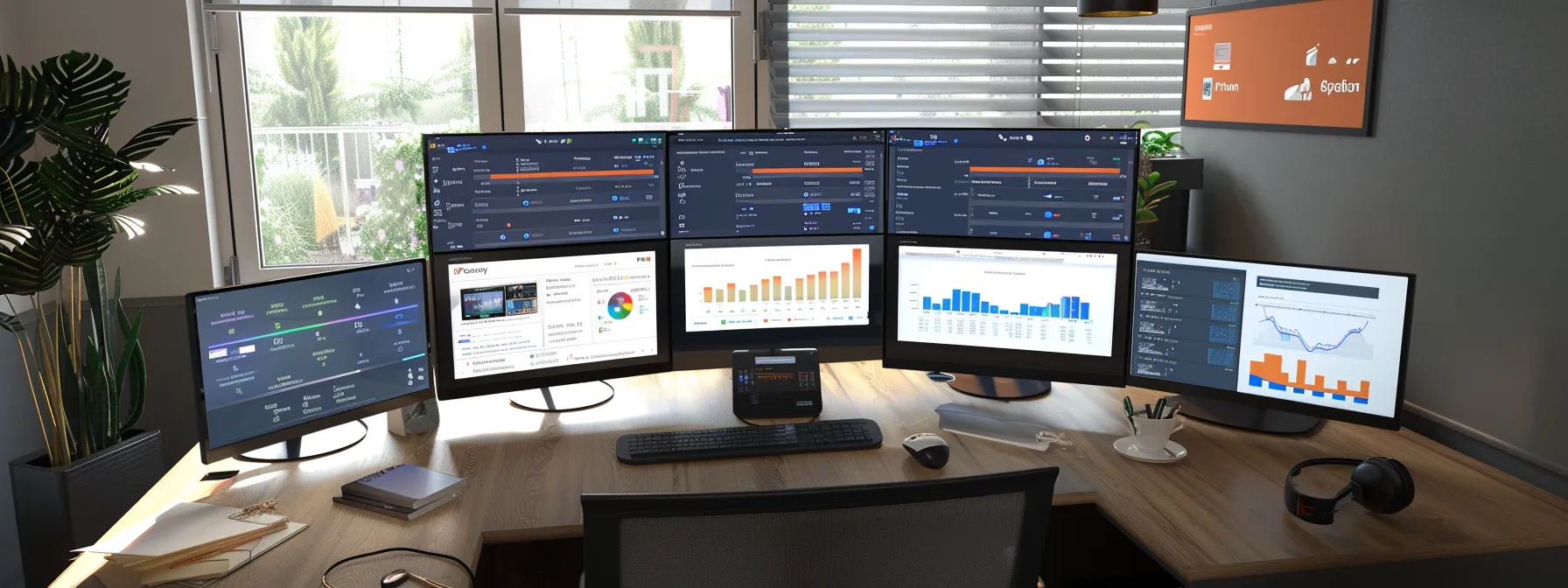Are you struggling to keep up with your social media management tasks? Virtual assistants can streamline your social media efforts, from scheduling posts to engaging with followers. This article will explore how virtual assistants can optimize your social media strategy, focusing on key tasks they can handle and effective delegation strategies. You’ll learn how to leverage tools like Hubspot and Hootsuite for seamless collaboration and discover how virtual assistants can enhance your brand’s online presence through media monitoring and research. By the end, you’ll understand how to maximize your social media management with virtual assistants.
Key Takeaways
- Virtual assistants streamline social media management, boosting efficiency and reducing costs for businesses
- Clear communication and regular feedback are crucial for effective collaboration with virtual assistants
- Project management tools and social media platforms enhance productivity in managing social media tasks
- Setting measurable goals and tracking progress helps optimize social media management with virtual assistants
- Encouraging creative input from virtual assistants can lead to fresh, engaging content for social media
Understanding the Role of Virtual Assistants in Social Media Management

Virtual assistants play a crucial role in modern social media management. They help businesses navigate the internet landscape, boost visibility, and engage consumers. This section explores their definition, the growth of remote support, comparisons with in-house teams, and tasks suited for delegation. As competition intensifies, virtual assistants leverage artificial intelligence to streamline social media operations effectively.
Defining Virtual Assistants and Their Contributions
Virtual assistants are remote professionals who help businesses manage their social media presence in the digital landscape. They contribute to a company’s marketing strategy by handling tasks such as content creation, scheduling posts, and analyzing data. These assistants often possess the intelligence to navigate various platforms, including native advertising, and can adapt to the ever-changing social media environment.
Exploring the Growth of Remote Social Media Support
Remote social media support has grown significantly, driven by the rise of online advertising and the need for effective lead generation. Virtual assistants now manage complex social media campaigns, providing valuable information through comprehensive dashboards. They often handle Google Ads and other platforms, offering businesses a cost-effective way to maintain a strong online presence without the need for large in-house teams. This growth reflects the increasing demand for flexible, scalable social media management solutions:
Comparing Virtual Assistants to in-House Social Media Teams
Virtual assistants offer a flexible alternative to in-house social media teams, providing specialized skills in graphics, marketing, and social network management. They use advanced tools to streamline social media marketing efforts across platforms, often delivering cost-effective results. While in-house teams may have deeper brand knowledge, virtual assistants bring diverse experience and can adapt quickly to new trends in the ever-evolving social media landscape.
Recognizing Tasks Ideal for Virtual Assistant Delegation
Virtual assistants excel at handling various social media tasks, making them ideal for delegating crucial aspects of a company’s media strategy. They possess the skills to manage landing pages, create engaging content, and conduct sentiment analysis across different platforms. By entrusting these tasks to virtual assistants, businesses can focus on core activities while ensuring their social media presence remains robust and responsive to audience needs.
Benefits of Incorporating Virtual Assistants Into Your Social Media Strategy

Virtual assistants offer significant benefits for social media management. They boost efficiency in campaigns, reduce costs, provide access to specialized skills, and allow businesses to scale efforts as needed. By leveraging virtual assistants, companies can improve their social listening, create better social posts, and manage budgets effectively. A skilled social media manager can use these remote professionals to enhance overall strategy and performance.
Boosting Efficiency and Productivity in Social Campaigns
Virtual assistants boost efficiency and productivity in social campaigns by streamlining tasks and leveraging automation. They use tools to monitor conversations and gauge target market attention, allowing businesses to respond quickly and effectively. Virtual assistants optimize social media workflows, freeing up time for strategic planning and creative content development:
Reducing Overhead Costs With Remote Assistance
Virtual assistants enable businesses to reduce overhead costs significantly by eliminating the need for in-house social media teams. They provide cost-effective solutions for customer service, social media analytics, and influencer marketing without the expenses associated with full-time employees. By leveraging remote assistance, companies can optimize their customer relationship management processes while maintaining high-quality social media presence. This approach allows businesses to allocate resources more efficiently, focusing on core activities while virtual assistants handle the day-to-day management of social media platforms:
- Reduced office space requirements
- Lower equipment and software costs
- Flexible scaling of social media efforts
- Decreased training and onboarding expenses
- Improved cost-efficiency in specialized tasks
Scaling Social Media Efforts According to Business Needs
Virtual assistants enable businesses to scale their social media efforts according to their needs, adapting to changes in brand awareness goals and market demands. They can quickly adjust strategies based on analytics from platforms like Zoho, ensuring companies stay ahead of algorithm updates and maintain a positive reputation. This flexibility allows businesses to expand their social media presence during peak seasons or campaigns, and scale back during quieter periods, optimizing resource allocation and maximizing return on investment.
Key Social Media Tasks Handled by Virtual Assistants

Virtual assistants handle key social media tasks, optimizing management and boosting return on investment. They craft engaging content, schedule posts across platforms, manage audience interaction, monitor metrics, and assist with paid advertising. Using specialized software, these professionals streamline social media operations, enhancing design, revenue, and overall performance for businesses.
Crafting and Curating Engaging Content
Virtual assistants excel at crafting and curating engaging content for social media advertising. They use tools like Zoho Social to schedule posts and implement an effective content strategy. These professionals stay updated on platform trends, creating diverse content types that resonate with the target audience. By leveraging data from Salesforce, virtual assistants optimize content for maximum engagement and reach:
- Create tailored content for each platform
- Use data-driven insights to refine content strategy
- Schedule posts for optimal engagement times
- Curate relevant third-party content to supplement original posts
- Adapt content based on performance metrics
Scheduling Posts Across Multiple Platforms
Virtual assistants streamline content management across multiple social media platforms, saving companies valuable time and resources. They utilize technology to schedule posts at optimal times, ensuring consistent digital marketing efforts across various channels. By implementing efficient scheduling strategies, virtual assistants help businesses maintain a strong online presence and engage their target audience effectively.
Managing Audience Engagement and Community Interaction
Virtual assistants excel at managing audience engagement and community interaction across social media platforms. They use personalization techniques to create tailored responses, fostering meaningful connections with followers. These professionals employ social media scheduling tools to ensure timely replies and maintain consistent engagement. Their organizational skills allow them to efficiently handle multiple conversations, while their creativity helps in crafting unique and engaging responses. Virtual assistants play a crucial role in building and nurturing online communities, which is essential for brand loyalty and customer retention:
- Monitor and respond to comments, messages, and mentions
- Create and manage social media contests and campaigns
- Facilitate discussions and encourage user-generated content
- Address customer inquiries and concerns promptly
- Analyze engagement metrics to refine interaction strategies
Monitoring Social Media Metrics and Analytics
Virtual assistants excel at monitoring social media metrics and analytics, providing businesses with valuable insights to refine their strategies. They use advanced tools to track customer engagement, measure search engine performance, and conduct regular audits of social media activities. By analyzing these metrics, virtual assistants help companies optimize their community-building efforts and adjust their overall social media strategy for better results.
Assisting With Paid Advertising and Promotions
Virtual assistants play a crucial role in managing paid advertising and promotions for social media campaigns. They help social marketing managers target the right audience, optimize ad spend, and analyze customer feedback to refine strategies. These professionals use advanced tools to monitor ad performance, adjust targeting parameters, and provide timely customer support for promoted content. By leveraging their expertise, businesses can maximize the return on investment for their social media advertising efforts:
Strategies for Effectively Delegating to Virtual Assistants

Effective delegation to virtual assistants is key for optimizing social media management. This section covers setting clear objectives, communicating brand guidelines, establishing regular feedback, and using collaboration tools. By focusing on these strategies, businesses can improve content creation, enhance usability, and build customer loyalty while maximizing their resources.
Establishing Clear Objectives and Expectations
Clear objectives and expectations are essential for effective collaboration between social managers and virtual assistants. By defining specific goals, outlining content curation tasks, and setting measurable targets, businesses ensure that virtual assistants understand their role in the social media strategy. This clarity enhances the overall experience and knowledge transfer, leading to more efficient and targeted social media management:
Communicating Brand Voice and Guidelines
Effective communication of brand voice and guidelines is crucial when working with virtual assistants in social media management. Companies must provide clear instructions on their brand’s tone, style, and messaging to ensure consistency across all platforms. By creating a comprehensive brand guide that outlines language preferences, visual elements, and core values, businesses enable virtual assistants to accurately represent the brand in every interaction and content piece.
Setting Up Regular Communication and Feedback
Regular communication and feedback are essential for effective collaboration with virtual assistants in social media management. Companies should establish weekly check-ins to review performance, discuss challenges, and provide guidance on upcoming tasks. This consistent communication ensures that virtual assistants stay aligned with the company’s goals and can quickly adapt to changes in strategy. Implementing a feedback system allows for continuous improvement and helps virtual assistants refine their skills to better serve the company’s social media needs:
- Schedule weekly video calls or chat sessions
- Use project management tools for task tracking
- Provide timely feedback on completed work
- Encourage virtual assistants to share insights and suggestions
- Conduct monthly performance reviews
Enhancing Collaboration With the Right Tools and Technologies

Effective collaboration between businesses and virtual assistants requires the right tools and technologies. This section explores how project management software organizes tasks, social media platforms boost efficiency, messaging apps enable real-time communication, and cloud solutions facilitate secure resource sharing. These tools streamline workflows and enhance productivity in social media management.
Leveraging Social Media Management Platforms for Efficiency
Social media management platforms enhance efficiency for virtual assistants by centralizing tasks and streamlining workflows. These tools enable scheduling posts across multiple networks, tracking engagement metrics, and managing customer interactions from a single dashboard. By using platforms virtual assistants can optimize content delivery, analyze performance, and adjust strategies in real-time, leading to more effective social media campaigns:
Facilitating Real-Time Communication With Messaging Apps
Messaging apps facilitate real-time communication between virtual assistants and social media managers, enhancing collaboration and responsiveness. These tools enable quick exchanges of ideas, updates, and feedback, allowing teams to address urgent social media matters promptly. By using apps like Slack or Microsoft Teams, businesses can create dedicated channels for different social media projects, ensuring that all team members stay informed and can contribute to discussions efficiently.
Sharing Resources Securely Through Cloud-Based Solutions
Cloud-based solutions provide secure resource sharing for virtual assistants and social media managers. These platforms, such as Google Drive or Dropbox, allow teams to store, access, and collaborate on files from anywhere, enhancing productivity in social media management. By implementing robust security measures like encryption and two-factor authentication, businesses ensure that sensitive information remains protected while enabling seamless collaboration with virtual assistants.
Optimizing Your Social Media Management With Virtual Assistants

Optimizing social media management with virtual assistants involves setting measurable goals, providing brand-aligned training, encouraging creative input, and regularly reviewing performance. These strategies help businesses maximize their social media presence, improve engagement, and achieve their marketing objectives efficiently. By implementing these practices, companies can leverage the full potential of virtual assistants in their social media efforts.
Setting Measurable Goals and Tracking Progress
Setting measurable goals and tracking progress is crucial for optimizing social media management with virtual assistants. Companies should establish specific, quantifiable objectives for their social media efforts, such as increasing follower count, improving engagement rates, or boosting website traffic from social platforms. Virtual assistants can then use these goals to guide their daily tasks and measure the effectiveness of their strategies. Regular performance reviews allow businesses to assess progress, identify areas for improvement, and adjust their approach as needed, ensuring that virtual assistants continue to deliver value and contribute to the company’s social media success.
Providing Training to Align With Your Brand Strategy
Providing comprehensive training to virtual assistants ensures alignment with a company’s brand strategy in social media management. Businesses should create detailed guides covering brand voice, visual identity, and content guidelines to maintain consistency across all platforms. Regular training sessions help virtual assistants stay updated on brand developments and industry trends, enabling them to represent the company effectively in social media interactions.
Encouraging Creative Input and Innovation
Encouraging creative input and innovation from virtual assistants can significantly enhance social media management. Companies should create an environment where virtual assistants feel comfortable sharing new ideas for content, engagement strategies, or platform-specific approaches. By fostering a culture of innovation, businesses can tap into the diverse experiences and perspectives of their virtual assistants, leading to fresh and engaging social media content that resonates with audiences.
Regularly Reviewing Performance and Making Adjustments
Regular performance reviews and adjustments are essential for optimizing social media management with virtual assistants. Companies should analyze key metrics such as engagement rates, follower growth, and conversion rates to assess the effectiveness of their strategies. Based on these insights, businesses can work with virtual assistants to refine content approaches, adjust posting schedules, or explore new platform features. This ongoing process of evaluation and adaptation ensures that social media efforts remain aligned with business goals and responsive to changing audience preferences.
Conclusion
Virtual assistants revolutionize social media management by streamlining tasks, reducing costs, and providing access to specialized skills. They handle crucial activities such as content creation, scheduling, audience engagement, and analytics monitoring, allowing businesses to focus on core strategies. Effective collaboration with virtual assistants requires clear communication, proper tools, and regular performance reviews to ensure alignment with brand goals. By optimizing social media management through virtual assistants, companies can enhance their online presence, improve engagement, and achieve marketing objectives more efficiently.

